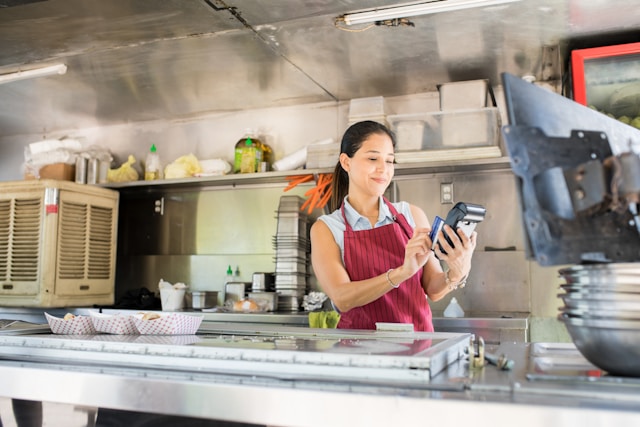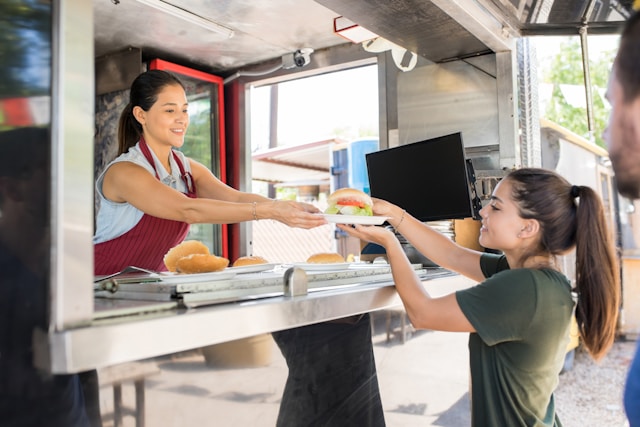Food Truck Business Permits: A Guide to Navigating Regulations
Navigate the food truck permitting process with ease. Learn about essential licenses, application steps, and tips for compliance in this guide.

Continue exploring the next articles in this series:
Discover the pros and cons of starting a food truck business. Learn about the benefits, challenges, and how to navigate…
Or navigate back to explore other related content :
Explore the food truck business model: mobility, flexibility, and low costs. Learn the framework for success in this thriving culinary…
01: Introduction
Obtaining the right permits and licenses is one of the most critical steps in launching a food truck business. Without proper documentation, you risk fines, operational delays, or even business closure. Since requirements vary by location, understanding the regulatory landscape is essential to ensure compliance. In this guide, we’ll walk you through the common permits and licenses needed for a food truck business, how to apply for them, and tips for staying compliant.
02: Why Permits Are Crucial for Food Truck Businesses
Permits and licenses are legally required to ensure food trucks meet health, safety, and zoning standards. Operating without them can result in:
- Fines and Penalties: Non-compliance can lead to hefty fines and potential legal action.
- Operational Interruptions: Food trucks without permits may face forced closures during inspections.
- Customer Trust Issues: Displaying proper permits reassures customers of your legitimacy and commitment to quality.
Being proactive about obtaining permits can save time, money, and stress in the long run.
03: Common Permits and Licenses Required
Business License
A general business license is required to legally operate any business. It proves that you are registered with your city or state and pay necessary taxes. Check with your local government office for application details.
Health Permit
Also known as a food service license, this permit ensures that your truck adheres to food safety regulations. You’ll need to pass health inspections covering:
- Proper food storage and handling.
- Kitchen cleanliness and sanitation.
- Equipment maintenance and safety.
Mobile Vendor Permit
This permit allows you to sell food from a mobile unit. In some cities, the number of available permits is limited, so applying early is essential.
Parking Permits
Food trucks often require specific parking permits to operate in public spaces. Permits may vary depending on whether you’re parking in a business district, near an event, or on private property.
Commissary Kitchen Agreement
Some jurisdictions require food trucks to use a licensed commissary kitchen for food preparation and storage. This ensures that your operations meet health standards beyond the truck.
04: How to Obtain Permits and Licenses
Research Local Requirements
Permit requirements vary widely between cities, counties, and states. Visit your local government or health department’s website to review specific regulations for your area.
Prepare Documentation
Typical documentation includes:
- Proof of business registration.
- Vehicle inspection certificates.
- Food safety training certifications.
- Commissary kitchen agreements (if required).
Schedule Inspections
Health and fire inspections are mandatory for most permits. Ensure your truck is fully equipped and adheres to all safety standards before scheduling these inspections.
Submit Applications
Apply for permits well in advance of your intended launch date. Processing times can range from weeks to months, depending on the jurisdiction.
Renew Annually
Most permits require annual renewal. Keep track of expiration dates and budget for renewal fees to avoid lapses in compliance.
05: Tips for Navigating the Permitting Process
Start Early
Delays in obtaining permits can postpone your launch. Begin the application process as soon as your truck is ready for inspection.
Consult Experts
If navigating the permitting process feels overwhelming, consider hiring a consultant or attorney familiar with local regulations. Their expertise can streamline the process and help avoid costly mistakes.
Stay Organized
Keep all permits and licenses in a dedicated file or digital folder. This makes renewals and inspections more efficient.
Build Relationships with Inspectors
Maintaining good rapport with health and fire inspectors can make future interactions smoother. Demonstrating a commitment to compliance shows professionalism.
06: Challenges and How to Overcome Them
Limited Permit Availability
In high-demand cities, mobile vendor permits may be capped. Apply early and explore alternatives, such as operating in neighboring areas or attending private events.
Changing Regulations
Local laws can change, requiring adjustments to your operations. Stay informed by subscribing to updates from local government websites or industry newsletters.
Permit Costs
Permit fees vary widely and can add up quickly. Include these costs in your financial plan and budget accordingly.
07: Next Steps in Your Food Truck Journey
Securing permits is a vital step in launching your food truck business, ensuring that your operations are legal and safe. Once your permits are in place, you’re ready to dive deeper into other aspects of the business. Explore the next level of insights:
- Food Truck Business: Pros and Cons: Evaluate the benefits and challenges of running a food truck.
- Starting a Food Truck Business: Learn how to set up and launch your food truck with confidence.
With proper planning and preparation, you’ll be well on your way to operating a successful and compliant food truck business.
- FAQ
fREQUENTLY ASKED QUESTIONS
What permits do I need to start a food truck business?
Common permits include a business license, health permit, mobile vendor permit, parking permits, and fire department approval.
How do I get a health permit for a food truck?
Schedule a health inspection with your local health department. Ensure your truck meets food safety standards for storage, handling, and cleanliness.
What is a commissary kitchen agreement?
It’s a contract that allows food trucks to use a licensed kitchen for food prep and storage. Some cities require this for health compliance.
How much do food truck permits cost?
Costs vary by location and type of permit but can range from a few hundred to several thousand dollars annually.
Where can I learn more about food truck permits?
Explore our guides on Business Planning and Pros and Cons for additional tips and insights.
Continue exploring the next articles in this series:
Learn how to do a winning food truck business planning. From market research to financial planning, this guide sets you…
Discover the pros and cons of starting a food truck business. Learn about the benefits, challenges, and how to navigate…
Or navigate back to explore other related content :
Explore the food truck business model: mobility, flexibility, and low costs. Learn the framework for success in this thriving culinary…
- 176A South Van Brunt Street Englewood, NJ 07631
Copyright © 2023 Le Gourmet Factory. All Rights Reserved. Website Design, SEO and Internet Marketing by Creative Click Media.



